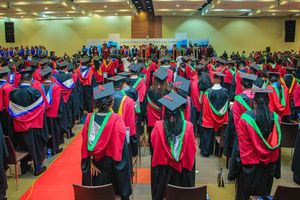
Dar es Salaam. In an era where unemployment and underemployment are growing concerns, Tanzanian university graduates are increasingly turning their hard-earned certificates into a different kind of currency—collateral for survival.
A university degree, once considered a gateway to stability and opportunity, has become a symbol of desperation for many.
Eliza, a 29-year-old teacher in Mbeya, shares her story with The Citizen: “I never thought my bachelor’s degree in Education would end up in someone’s drawer just because I needed Sh300,000 to pay rent and cover my child’s school fees,” she says.
Her monthly salary of barely Sh400,000, paid irregularly, offers no financial buffer, and the school she works for does not provide loans or salary advances.
In desperation, Eliza was forced to turn to an individual lender who demanded her original degree certificate as collateral.
“The lender said it was the only way he could trust I’d pay back the loan. The moment I handed it over, I felt like I had given away a part of my identity,” she said.
Her experience is not unique. Across Tanzania, university graduates, particularly those in low-paying or unstable jobs, are increasingly pawning their academic certificates to secure small loans from individual lenders, microfinance institutions, and informal credit providers. Some risk it for as little as Sh200,000.
A warning from the district commissioner
Recently, during the Tanzania Teachers’ Union (TTU) regional elections in Njombe, District Commissioner Juma Sweda issued a stern warning to teachers: “Stop using your academic certificates as collateral.”
He highlighted concerning cases where teachers were unable to present their certificates during verification exercises because they were being held by lenders due to unpaid debts.
“This is dangerous,” Mr Sweda warned. “These certificates took years to earn. They are personal, national documents. Teachers must value and safeguard them.”
The paradox of paper power
For many graduates, the economic reality is harsh. Godwin, a 33-year-old agriculture diploma holder, runs a small cassava farm in Lindi.
Each planting season, he needs a small loan—often no more than Sh150,000—to hire labor or buy fertilizer.
But since banks demand collateral he doesn’t have, Godwin uses his academic certificate to secure the funds.
“Banks ask for things I don’t have: a house, a car, or a land title. So I use my certificate. It gets me money within hours. It’s like a hoe or a machete. You use what you have to feed your family,” he said.
According to loan providers, many graduates lack assets like land or property that could serve as collateral.
As a result, lenders have turned to academic certificates, which are viewed as valuable due to their perceived importance.
“I know some people might be surprised, but many use their certificates to access these loans. Some even receive up to Sh1 million depending on their academic performance,” explains a microfinance institution owner in Iringa.
A system under strain
Education experts warn that while the desperation is understandable, the practice of using academic certificates as collateral is deeply troubling.
An education policy analyst, Dr Lilian Mbwambo, argues: “Certificates are personal, confidential, and irreplaceable documents.”
“When people are forced to use them as loan security, it tells us something is deeply wrong with our financial and employment systems,” she says.
“Why is a person with a degree in accounting, or a diploma in nursing, or a teacher with five years of experience unable to access decent credit from formal institutions?” she questioned.
The price of joblessness
According to the National Bureau of Statistics (NBS), more than 800,000 graduates enter Tanzania’s job market every year, but fewer than 100,000 find formal employment.
This mismatch leaves many graduates trapped in "survival employment"—low-paying, unstable jobs that often fail to meet their expectations.
“Sociologically, education used to be the great equalizer,” says a sociologist at the University of Dodoma (Udom), Mr Alfred Magessa.
“But now, we are seeing a reverse effect. The more educated you are, the more frustrated you might become because expectations are not being met,” he adds.
Furthermore, he says that some graduates now envy small-scale traders who, despite never attending a university, manage to thrive with their businesses, houses, and vehicles.
The role of banks
The banking sector also plays a significant role in this crisis. Banks often demand collateral that many young professionals do not possess, locking them out of formal credit systems.
“There is a clear mismatch between financial products and the realities of most young Tanzanians,” says a financial inclusion expert, Ms Aisha Mwalimu.
“If banks ask for land titles from someone who just graduated last year, they are locking out thousands,” she adds.
In this gap, informal lenders—some with predatory practices—have emerged, offering quick loans in exchange for academic certificates.
While these loans provide immediate relief, they come with strict repayment terms, leaving graduates with little choice but to trade their education for temporary financial stability.
Is the value of education declining?
The growing trend of using degrees as collateral raises concerns about the perceived value of education in Tanzania.
Jackson, a political science graduate, expresses his frustration: “I graduated four years ago. I’ve worked as a cashier, a call center agent, and now as a shopkeeper. None of these jobs care what I studied.”
“I used my degree as collateral for a Sh250,000 loan once. It felt pointless to keep it in my drawer while I was starving,” he says.
Education officials, however, warn against such perceptions. “The value of education is not just economic. It opens doors, builds critical thinking, and creates opportunities—some not immediate, but life-long,” says the Ministry of Education, Science and Technology expert.
A call for change
As this issue becomes more widespread, many are calling for solutions to both the financial crisis facing young graduates and the devaluation of their education.
Policymakers, education officials, and financial institutions must work together to create a more supportive environment for graduates—one that enables them to use their education meaningfully rather than as collateral for survival.
The country is in urgent need of job creation, career guidance, and alternative financing models that allow graduates to thrive without jeopardizing their academic credentials.
As Tanzania moves forward in its development agenda, the question remains: What is the true worth of a degree, and should it ever be traded for so little?


